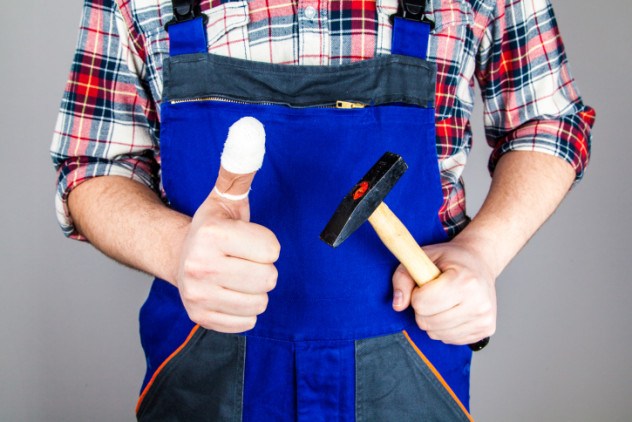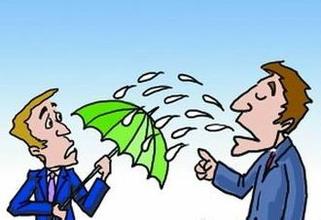(单词翻译:单击)
In today's world, we are often taught that being kind and respectful is the right way to get what we want. After all, the Golden Rule does state to treat others how you'd like to be treated yourself. However, being too nice could have a downside or two. Sometimes you need to make the tough decisions, blow off some steam on an innocent person, or act like a cocky know-it-all. In other words, sometimes you just need to act like a jerk. Believe it or not, acting like a jerk can sometimes pay off.
当今世界,我们总是被教导做一个待人友善、懂礼貌的人,这样才能达成自己的目标。毕竟,"己所不欲,勿施于人"可是黄金法则,但做老好人也会有消极的一面。有时候你需要做艰难的抉择,可能会伤及无辜,或者表现得像一个狂妄的万事通。换句话说,就是有时候你得变成"奇葩"。信不信由你,有时候"奇葩"反倒能有所收获。
10.Refusing To Apologize Makes You Feel Better
10.拒绝道歉会让自己好受

When we apologize, we acknowledge that we have done wrong and that we want to move forward on a better path. While this is a generally good rule to follow, it turns out that not apologizing might make you feel even better.
我们道歉,就是承认自己的错误,并且想要往更好的方向发展。一般说来,这是个不错的方法,但是我们发现,拒绝道歉甚至可能让你感觉更好。
A study published in the European Journal of Social Psychology had researcher Tyler Okimoto ask 228 participants to recall a time they had committed a wrongdoing. He then asked whether or not they apologized. The offenses ranged from cutting someone off in traffic to serious crimes like theft. The participants were divided into random groups and asked to compose an email explaining either why they were sorry or why they were not sorry. He found that those who didn't apologize ended up feeling better about themselves. One explanation is that an apology is an admission of guilt that gives the other party the upper hand. It gives the other person power over the apologizer as they can decide whether they want to accept or reject the apology. It also allows them to feel like they are morally justified in casting judgment upon the apologizer.
《欧洲社会心理学杂志》上发表过一篇论文,研究者泰勒·冲本让228位参与者回想他们曾犯下的一个错误,然后问他们是否为自己犯下的过错道歉。罪行从常见的在开车时挡在别人面前到盗窃这样的重罪都有。参与者被随机分为两组,并要求他们写一封邮件来解释他们感到抱歉与否的原因。他发现,那些拒绝道歉的人写到最后自我感觉更良好。有一种说法是,一旦道歉就等于承认自己的错误,这样就会让对方占上风。那么就给了对方控制道歉者的权利,他们可以选择接受或者拒绝道歉,同时他们也会认为他们随意评判道歉者是符合道义的行为。
9.Snooty Salespeople Sell More
9.傲慢的售货员销售更多

The customer is always right—unless you're selling a high-end luxury item. In that case, the customer probably has terrible taste in fashion and is likely an awful person who isn't even good enough to polish your shoes.
顾客永远是上帝——除非你卖的是高档奢侈品。在这种情况下,顾客的时尚品味可能非常糟糕,还可能是个给你擦鞋都不够格的人。
You might think that acting like a pretentious snob would be enough to drive any customer away from your business forever, but you would be wrong. A study from the University of British Columbia found that snobby salespeople who sell luxury brands are more likely to sell more. The researchers found that participants who interacted with rude salespeople were more likely to express a desire to own the brand that was being sold because they wanted to feel like they were part of an exclusive "in-group." In other words, being rejected made them want to conform and fit in. It is important to note that this only works for high-end brands like Gucci and Neiman Marcus, not for mass-market brands. The salesperson also had to embody the brand that they were selling; the effect wouldn't work if the salespeople were sloppy or unkempt. Rudeness is also a tactic that only seems to work in the short run. It may convince someone to buy something on impulse, but the effect will diminish over time.
你也许觉得表现出一副傲慢势利的样子,就可以让顾客不再光顾你的生意,那么你就大错特错了。不列颠哥伦比亚大学的一项研究发现,在奢侈品销售领域,傲慢的售货员卖出的东西可能更多。研究人员发现,与傲慢售货员交涉过的顾客似乎更愿意表现出自己对断货商品的购买欲望,因为他们想成为"圈子"独特的一员。换句话说,被冷落使得顾客更想得到认可,融入进奢侈品圈子里。需要注意的是,这里说的仅限于高端奢侈品圈子,比如古驰、美国尼曼,而非大众品牌。售货员本身也要能够体现出高端品牌的品质,如果售货员表现得无精打采或是蓬头垢面,那就没有顾客会来光顾生意。当然,表现得傲慢无礼也只是个短期策略。这种方法可能会使顾客一时冲动买下商品,但随着时间的推移,此方法的效果就会大大下降。
8.Swearing Increases Pain Tolerance
8.爆粗口让人更能忍受疼痛

A lot of us have sworn after hitting our head, accidentally walking into a glass door, or screwing up big time even though we know that curse words are often looked down upon by society at large. Four-letter words often carry negative connotations that nobody ever wants to hear, so these words are supposed to be reserved for great moments of frustration and anger. They might make others uncomfortable, but there is scientific evidence that curse words might make the user more comfortable when faced with pain or discomfort.
即使我们知道脏话会让社会上很多人嗤之以鼻,但很多人还是会在被砸到脑袋、不小心撞到玻璃门,或者浪费大把时间之后咒骂两句。脏话通常带有负面意义,没人想要听,所以这些话不到挫败和愤怒之时就不要冲口而出。虽然脏话可能会让其他人不舒服,但有科学证据显示,脏话会让说的人在经受痛苦或不适时好受些。
Richard Stephens and his colleagues at the Keele University School of Psychology conducted a study to demonstrate how swearing might help affect someone's pain tolerance. The researchers gathered 67 participants and asked them to make two lists of five words. The first list contained words one might say after accidentally smashing his or her thumb with a hammer. The second list was composed of words that could be used to describe a table. The participants were then instructed to hold their hand in a bucket of room temperature water for three minutes in order to allow their hand adjust to the temperature before then submerging it into icy cold water. Half of the participants were asked to repeat the set of words that they might say if they hit their thumbs with a hammer, and the other half were asked to repeat the set of words that describe a table. The participants who repeated the curse words were not only able to keep their hand underwater for longer periods of time, but they also reported experiencing less pain. Swearing also apparently increased the participants' heart rates. The researchers believe that swearing helps increase pain tolerance because it, much like pain, helps invoke negative emotions, which sends the body into a fight-or-flight response that increases heart rate and decreases pain.
基尔大学心理学学院的理查德·史蒂芬和他的同事们进行了一项研究,探究爆粗口是怎样影响人的疼痛耐受度。研究人员征集了67名参与者并要求他们列出两张各包含5个词的清单,第一张清单中要写出人们意外被锤子砸中拇指时可能说的词,第二张清单则要包括五个用来描述桌子的词。随后,他们请参与者把手放进室温下的水桶里浸泡三分钟以使他们的手适应这个温度,接着再将手浸入冰水中。一半的参与者被要求重复被锤子砸到拇指时会说的话,另一半则要重复描述桌子的词。那些参与者不断爆粗口的不仅可以将手浸在水中更长时间,也显示出他们承受的痛感更轻微。另外,爆粗口会显著增加参与者的心率。研究人员认为,爆粗口让人更能忍受疼痛是因为,像疼痛一样,脏话引发了负面情绪,使身体进入应激反应状态,从而提高心率减少痛感。
7.Complaining Is Good For You
7.抱怨对你有好处

People usually don't enjoy listening to somebody else needlessly complain. The situation quickly becomes miserable. However, there is a silver lining. There are actually quite a few benefits to complaining, including the fact that doing so can actually make you happier.
通常人们都不喜欢听别人没有必要的抱怨,因为听完整个人就不好了。然而,抱怨还是有几分可取之处的。实际上抱怨着实有不少好处,其中就包括能让人更开心。
Professor Robin Kowalski from Clemson University studied over 400 men and women who listed their complaints about a current or former partner before being asked to fill out a questionnaire regarding their happiness, mindfulness, and relationship satisfaction. Kowalski found that those who complained were indeed happier, but only if they complained with the intent of achieving a certain goal rather than just mindlessly complaining. In other words, Kowalski found that the most productive complaints are ones that serve a purpose. Complaining, when done the right way, can actually help us accomplish great things. You can use complaints to your advantage in order to analyze all the problems in your life and sort out which are truly worth worrying about and which can be fixed. Try organizing all of your complaints and decide which you have no control over (and therefore can't fix) and which you actually can fix so that you can then proceed to develop a solution. Just don't make your solution too difficult to accomplish, or you might wind up complaining even more.
克莱姆森大学的罗宾·科沃斯基教授研究了超过400名男女,让他们列出对现任或前任伴侣的抱怨不满,然后填写一份关于幸福感、意识和关系满意度的调查问卷。科沃斯基发现那些抱怨的人确实会更幸福,但是只有在他们为实现某种确定目标而抱怨才有效果,而不只是盲目抱怨。换句话说,科沃斯基发现最有效的抱怨是以目的为前提的。当抱怨用入正途,它们着实可以帮我们完成很多重要的事。你可以巧用抱怨来分析生活中遇到的所有问题,找出哪些是真正值得担心,哪些又是可以解决的。我们要试着管理自己的抱怨,决定出哪些是不可控的(因此不能解决的),哪些实际上是可以解决的,进而可以制定解决方案。不过,你可不要让解决方法太难而无法实现,不然抱怨会更多。
6.Mean People Get Paid More
6.刻薄的人工资更高

Have you ever heard that "nice guys finish last" or that "it pays to be a jerk"? It turns out that both those phrases might be somewhat true—jerks literally get paid more money at work. Researchers from Cornell University, University of Western Ontario, and University of Notre Dame looked at the salaries of various men and women and found that those who were more "agreeable" also had a significantly lower salary.
你听说过"好人最后总是输给蠢人"或者"做个混蛋!"吗?这些俗语有时候是对的,因为刻薄的人确实工资更高!来自康奈尔大学、西安大略大学和圣母大学的研究者调查了各种人群的收入,发现那些所谓"讨人喜欢"的员工的工资很明显要少一些。
Younger and agreeable men suffer the pay disparity as they earn almost $7,000 less than their meaner counterparts. In a follow-up study that included older men, the gap widened to over $10,000. That's not to say that women don't suffer as well. The first study found that agreeable women make $1,100 less than disagreeable women. The follow-up study found that agreeable women make about $3,000 less than their disagreeable counterparts. There could be several reasons for this. Less agreeable people are probably a lot better at negotiating salaries and able to make more tough decisions. The gap could be widest for men because men who are more passive are often seen as less masculine and less competent for leadership roles.
那些年轻、讨人喜欢的男性员工比吝啬的同事们年收入少了近7000美元。在接下来的调查统计中,年长男性员工的收入,与其差距高达10,000美元!女性员工的情况也不容乐观。第一次调查发现,讨人喜欢的女性员工比刻薄的女性员工年收入少了1,100美元。到第二次调查时,差距扩大到了3,000美元。有很多原因可以解释这个现象。吝啬的人会对工资斤斤计较,并且能够做出一些艰难的决定。男性的收入差距更大,是因为那些做事被动的人常常优柔寡断,缺乏领导层岗位的竞争能力。
审校:庄粉玲 来源:前十网


